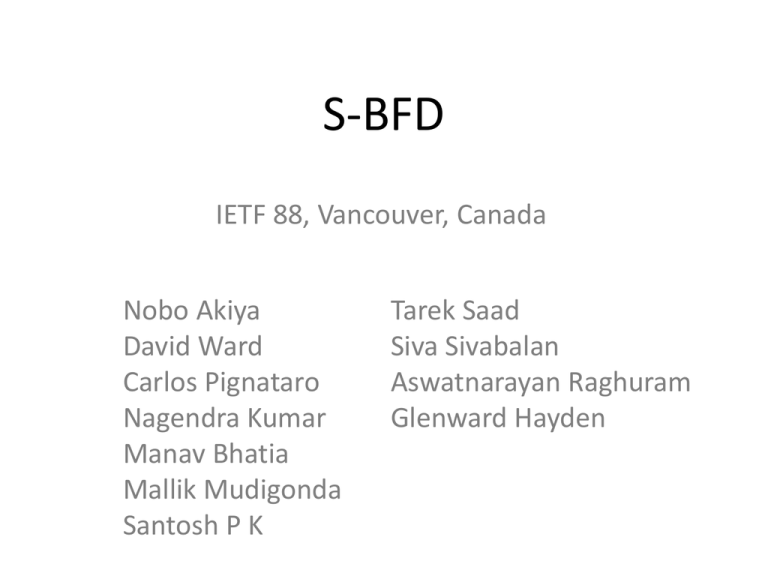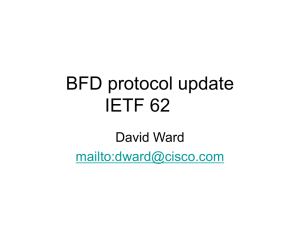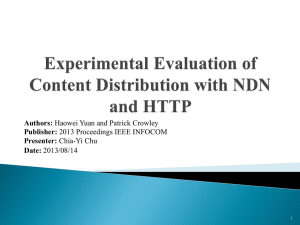Seamless BFD
advertisement

S-BFD IETF 88, Vancouver, Canada Nobo Akiya David Ward Carlos Pignataro Nagendra Kumar Manav Bhatia Mallik Mudigonda Santosh P K Tarek Saad Siva Sivabalan Aswatnarayan Raghuram Glenward Hayden Why Another Flavor of BFD? • Existing BFD is excellent for bi-directional reachability validation scenarios • S-BFD provides improved control, flexibility and simplified operations to initiator for even wider range of scenarios and use-cases • Why? – – – – Faster reachability verifications Reduction of false failures Built-in fault isolation Better fits those difficult with existing BFD: anycast, centralized controller initiation, etc How S-BFD Works? [1] • Pre-create reflector sessions in the network • Allocate discrim for local network identifier • Create reflector session to listen for S-BFD packets coming in with your_discrim = allocated discrim 1.1.1.1 A A allocates 0x01010101 discrim for 1.1.1.1 IPv4 address B allocates 0x01010102 discrim for 1.1.1.2 IPv4 address Etc Reflector session handles 1.1.1.2 1.1.1.3 S-BFD coming in with your_discrim=0x01010103 B C D E F 1.1.1.4 1.1.1.5 1.1.1.6 How S-BFD Works? [2] • Initiator to send S-BFD packet to reflector session • Any transport • your_discrim=<discrim of intended target> • my_discrim=<locally allocated for this initiator instance> Transport your_discrim=0x01010103 my_discrim=xxx_on_A Transport your_discrim=0x01010103 my_discrim=yyy_on_F 1.1.1.1 1.1.1.2 1.1.1.3 A B C D E F 1.1.1.4 1.1.1.5 1.1.1.6 How S-BFD Works? [3] • Reflector session to send response S-BFD packets • Only handles your_discrim for me, otherwise drop • Send response S-BFD packets back to initiator • Single reflector session can handle multiple initiators Swap discrim on response Transport your_discrim=xxx_on_A my_discrim=0x01010103 1.1.1.1 1.1.1.2 1.1.1.3 A B C Transport your_discrim=yyy_on_F my_discrim=0x01010103 D E F 1.1.1.4 1.1.1.5 1.1.1.6 Yes … • S-BFD is like one-sided echo • But … works for IP multihop, “loop” only on intended target and preserves minimal communication between end points • S-BFD is like demand mode • But … no per session state on egress, no bootstrapping, and allows one-to-many (many initiators to one reflector session) • S-BFD is like ping/traceroute • But … comes w/ great performance and scalability of BFD as result of still using fixed BFD header, and supports multiple transports S-BFD Alert Discriminator • Same discriminator allocated as reflection point in multiple network nodes, called Alert Discrim • Your_discr=<alert discrim> can solicit response from those network nodes • S-BFD Path Tracing Example – Multihop S-BFD detects failure … – Send S-BFD packets with your_discr=<alert discrim>, with incrementing TTL – Record source IP address from received responses. – Using anything else may traverse ECMP differently! • (Alert Discrim + Diag) can indicate various hints S-BFD Drafts • • • • draft-akiya-bfd-seamless-base-02 draft-akiya-bfd-seamless-ip-00 draft-akiya-bfd-seamless-sr-00 draft-akiya-bfd-seamless-alert-discrim-00 Major Changes in Base Versions • -00 -> -01 In addition, reflector BFD session SHOULD transmit response BFD control packet on the same interface on which it received the packet from initiator. • -01-> -02 – New single UDP destination port for S-BFD • Separate discriminator pool MAY be implemented – Initiator state machine (Down/Up/AdminDown) Next Steps • Add more contents for security aspect in base – Spoofed packets can cause loops, D bit to fix? – Clarifications on authentications on S-BFD • Polish up IP/SR/AlertDiscrim documents • Would like WG review • Request for WG adoption [near future] Thank you! Questions/Comments? Backup Slide (in case we need to discuss with topology) 1.1.1.1 1.1.1.2 1.1.1.3 A B C 1.1.1.5 D 1.1.1.6 E F G H I 1.1.1.7 1.1.1.8 1.1.1.9 1.1.1.4









